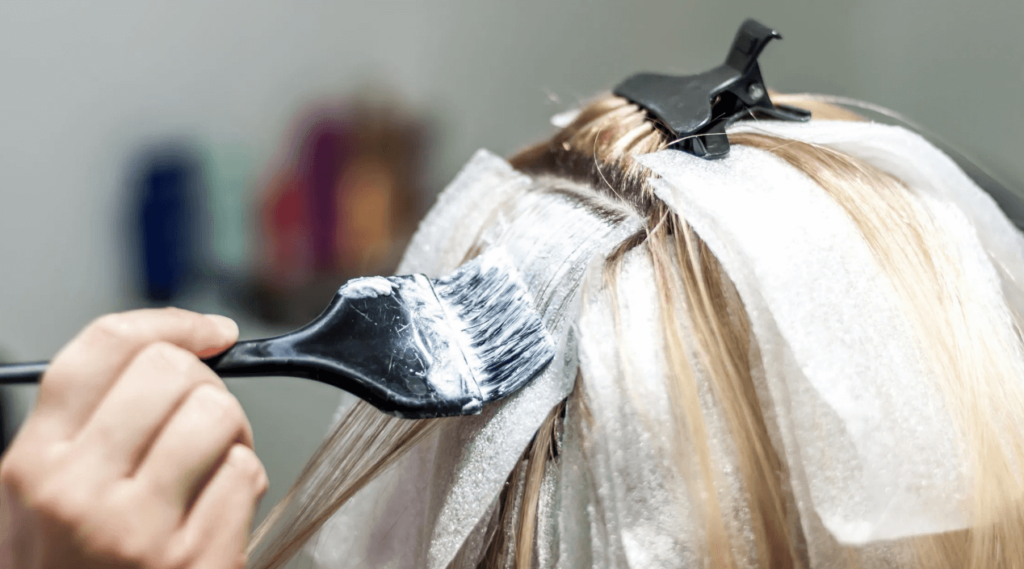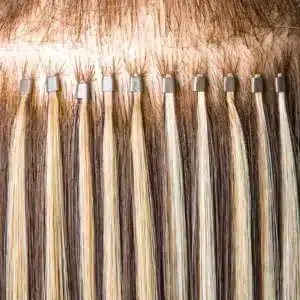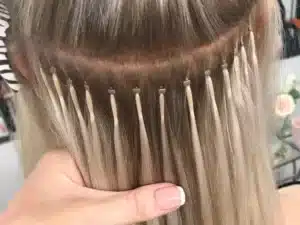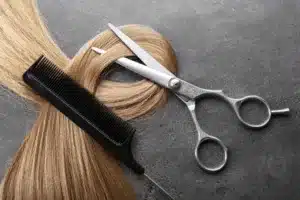Bleaching is often seen as a fast way to achieve lighter and brighter tones. Many salon clients request it, hoping extensions can be treated like their natural hair. Yet, the reality is very different when it comes to professional extensions.
You should not bleach hair extensions. In manufacturing, human hair extensions—especially blonde or lighter shades—have already been bleached once to strip out natural pigments and create a uniform base. A second round of bleach damages the fiber, reduces lifespan, and compromises quality. While some stylists may attempt strand tests, from a manufacturer’s standpoint, bleaching is never recommended because it puts the integrity of the product at risk.
Bleach changes the very structure of hair, and extensions cannot regenerate or repair themselves like natural hair attached to a scalp can. Let’s explore why bleaching is discouraged, what happens if you attempt it, and what safer alternatives exist.

Can you bleach hair extensions?
This is one of the most common questions asked by salon clients and stylists alike. The short answer is no—extensions should not be bleached after purchase. The temptation comes from wanting to adjust tone, but the risks outweigh the benefits.
Hair extensions are already processed during manufacturing. Raw ponytail hair is carefully lightened to achieve consistent tones across large batches. This ensures the final wefts or tips blend seamlessly in salon applications. Attempting to bleach them again removes essential cuticle layers and destabilizes the fibers.
Dive Deeper: The Manufacturing Reality
In professional factories, hair undergoes a controlled bleaching process before being colored into salon-ready shades. For example, natural black or dark brown hair must be lifted several levels to reach blonde bases. This process already uses peroxide and controlled heat under strict supervision to preserve strength. Once that step is complete, the hair is deposited with the target shade and sealed.
When salons try to bleach extensions again, they are essentially bleaching hair that has already been bleached. This “double lifting” causes the shaft to lose structure. Unlike natural hair, extensions no longer have access to a root supply of natural oils or keratin to recover. Once damaged, they stay damaged.
Key Risks of Attempted Bleaching:
- Loss of smooth cuticle integrity.
- Extreme dryness and straw-like texture.
- Permanent breakage or mid-shaft snapping.
- Increased tangling and matting.
- Color lifting inconsistently, often turning orange or brassy.
| Hair Type | Can It Be Safely Bleached? | Notes |
|---|---|---|
| Full Cuticle Hair | Not recommended | Already lightened during production; bleaching again reduces lifespan |
| Remy Hair | Unsafe | Cuticle partially stripped; bleach accelerates damage |
| Non-Remy Hair | Impossible | Acid-bathed, silicone-coated; bleach burns away coating |
| Synthetic Extensions | Impossible | Melts or burns when exposed to bleach |
The professional recommendation is always the same: do not bleach extensions. Choose the correct color from the beginning to avoid any need for lightening.

Why can’t you lighten hair extensions?
Stylists often explain to clients that their natural hair can be bleached at the salon, so why not extensions? The difference lies in how extensions are produced.
You cannot safely lighten extensions because the hair has already been chemically altered. In the factory, raw hair goes through bleaching to reach the desired base. Applying bleach again weakens the structure beyond repair and leads to uneven, patchy results.

Dive Deeper: The Chemistry Behind It
When natural hair is bleached, the process lifts melanin directly from the cortex of the strand. Extensions, however, have already had their natural pigment stripped away. They are then re-colored or toned in the factory to achieve even shades across the entire batch.
Bleaching extensions again is not lifting natural pigment; it is attempting to lift synthetic factory-applied pigment and residue. This produces unpredictable results. Some sections may lighten, while others stay dark or turn brassy.
Reasons Lightening Extensions Fails:
- Factory Pigments Resist Lift: These artificial pigments behave differently under bleach than natural melanin.
- Cuticle Layer Already Compromised: Without full protection, bleach penetrates too quickly, destroying structure.
- Chemical Overload: Extensions are no longer virgin strands; they have limited tolerance for chemical stress.
For clients, this means trying to lighten extensions almost always ends in disappointment. For salons, it results in complaints, refunds, and wasted inventory.
What happens if you bleach extensions?
The results of bleaching extensions are rarely positive. While clients expect bright blonde transformations, stylists often see the opposite—dry, weak, patchy strands that can no longer be worn.
When you bleach extensions, you compromise their durability, shorten their usable lifespan, and risk destroying them entirely.
Dive Deeper: The Consequences
1. Texture Damage: Extensions become rough and lose their natural silky feel. They no longer blend smoothly with natural hair.
2. Structural Breakage: The shaft may snap mid-length or fray at the ends, creating uneven layers.
3. Tangling: Without a smooth cuticle, strands catch on one another, leading to matting.
4. Lifespan Reduction: High-quality extensions designed to last 12–18 months may be ruined in one session.
5. Color Chaos: Instead of clean lift, extensions often turn orange, yellow, or brassy.
| Negative Outcome | Why It Happens |
|---|---|
| Dryness and Frizz | Moisture stripped away |
| Breakage | Cortex weakened by double bleaching |
| Patchy Color | Factory pigments lifting unevenly |
| Tangling | Cuticle layer destroyed |
| Shortened Lifespan | Fibers too weak for reuse |
Even if a stylist manages to bleach a strand, the result is fragile and temporary. From a professional manufacturer’s perspective, the risk is never worth it.

Can you change the color of hair extensions?
While lightening is unsafe, changing the color in other directions is possible. Stylists often ask if extensions can be dyed darker or toned.
Yes, you can change the color of hair extensions by going darker or by toning. These processes deposit pigment rather than lifting it, which is gentler and safer.
Dive Deeper: Safe Coloring Practices
Darkening: Extensions can safely be dyed one or two levels darker using semi-permanent or demi-permanent formulas.
Toning: Blonde or lighter shades can be adjusted with purple or blue toners to remove brassiness.
Glossing: A clear gloss can refresh shine and add a protective coating.
Best Practices:
- Always test on a small strand first.
- Avoid coloring directly on tape or keratin bond areas.
- Use ammonia-free or low-ammonia products.
- Apply conditioner treatments after coloring to restore moisture.
Never attempt to go lighter. Always source extensions in the correct shade for blonde or highlighted looks. This preserves quality and saves clients from disappointment.

What is the safest option for clients wanting lighter shades?
When a client insists on blonde or lighter tones, the correct approach is not bleaching existing extensions but selecting professionally manufactured lighter extensions from the start.
The safest option is always to purchase extensions in the exact color needed. Manufacturers like us provide a wide range of shades created under controlled conditions.

Dive Deeper: Why Pre-Colored Extensions Are Superior
Factories can control bleaching with precise timing, heat, and product quality. This ensures the hair lightens evenly across every strand. After bleaching, the hair is carefully toned, treated, and sealed for protection.
Advantages of Buying Pre-Colored Extensions:
- Even color consistency across every bundle.
- Longer lifespan because bleaching is done in controlled steps.
- Reduced dryness and breakage.
- Wide variety of shades that cover most salon needs.
Salons benefit because they can deliver predictable results without risking damage through additional chemical processing. Clients benefit because their extensions last longer and stay beautiful.
My Opinion
As a manufacturer, I strongly advise against bleaching hair extensions. Blonde and light-colored extensions are already bleached once during production to guarantee even base tones. Subjecting them to bleach again strips away strength, causing irreversible damage.
If a client insists on bleaching, it should only be attempted by a professional stylist with a strand test first. But even then, the risks remain high, and the lifespan of the extensions will be shortened.

The best path for salons and wholesale clients is simple: always source extensions in the correct shade from the beginning. This ensures durability, consistency, and satisfied customers without the dangers of bleach.
FAQ
Can I bleach blonde extensions to make them lighter?
No. Blonde extensions are already pre-bleached during production. A second bleach will destroy them.
Can I bleach dark extensions into blonde?
No. The lift will be uneven and cause extreme dryness or breakage.
Can synthetic extensions be bleached?
No. Synthetic fibers cannot tolerate bleach and will melt or burn.
Can I tone extensions instead of bleaching?
Yes. Toning is a safe way to adjust shade or reduce brassiness.
Can I dye extensions darker?
Yes, using semi-permanent or demi-permanent formulas. Always strand test first.
Why are blonde extensions risky to bleach again?
They have already been bleached during production to reach that light shade. A second bleach weakens the hair beyond repair.
Will bleach make extensions shed more?
Yes, because it breaks the bond between cuticle and cortex, leading to shedding.
How long do extensions last if they are bleached again?
They may last only weeks, compared to 12–18 months for untreated full cuticle extensions.
Why do manufacturers discourage bleaching?
Because it damages product quality, shortens lifespan, and creates inconsistent results.
What should I do if my client wants lighter hair?
Order pre-colored extensions in the correct shade from a trusted supplier.
Can tape-ins or keratin tips be bleached?
No. Bleach damages adhesive tapes and melts keratin bonds.
Do professional salons bleach extensions at all?
No. Professional salons and stylists rely on factory-colored extensions to avoid risk.
What is safer than bleaching?
Toning, glossing, or dyeing extensions darker. These deposit pigment instead of lifting.
Why do extensions turn brassy when bleached?
Factory pigments lift unevenly, leaving harsh orange or yellow tones.
Can I lighten just one shade with bleach?
Even a single-level lift puts the hair at risk. It is not recommended.

Conclusion
Bleaching extensions is unsafe. They are already processed during production, and bleaching them again only shortens their lifespan and harms quality. For professional, lasting results, always select extensions in the right shade from the beginning.
Hibiscus Hair Manufacturer has been dedicated to producing high-quality hair extensions for 25 years and is a recognized leader in the industry. If you are interested in finding a reliable hair extensions supplier and wholesale for your brand, please visit our website for more information:




